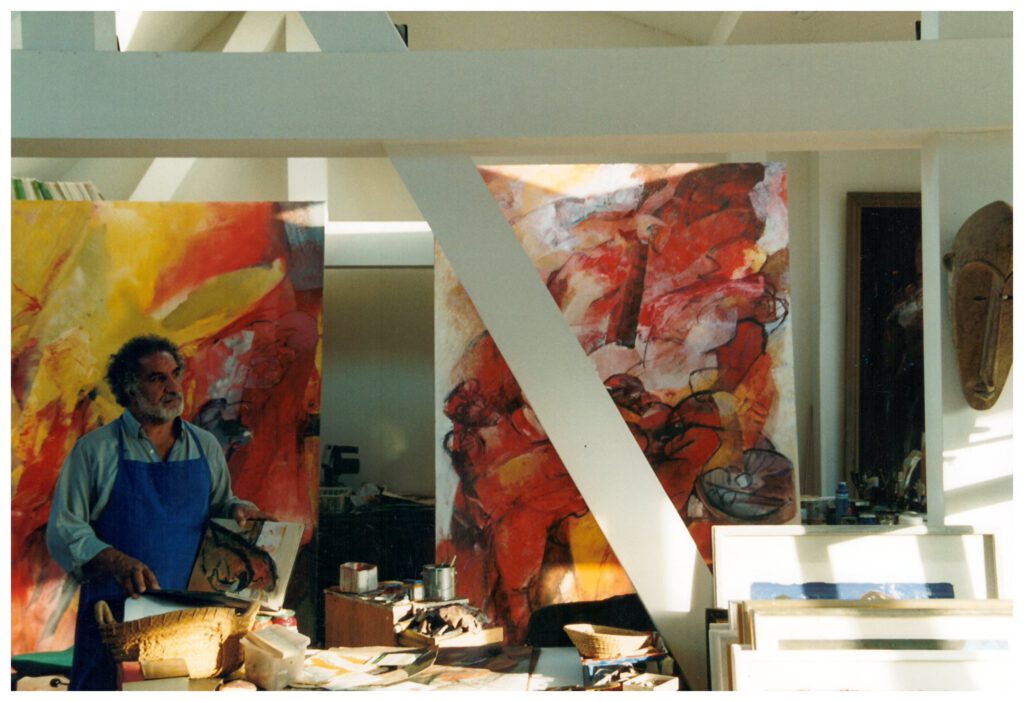Biography
Akbar Behkalam was a German-Iranian painter. He was born in 1944 in Tabriz, Iran, the capital of the East Azerbaijan province. He passed away in Berlin, Germany, on February 7, 2025. From 1961 to 1964, he studied art at the Tabriz Art School. After completing his military service, he moved to Istanbul, where he enrolled at Mimar Sinan University of Fine Arts and studied under Professor Bedri Rahmi Eyüboğlu.
Between 1972 and 1974, Behkalam lived in various European cities, including Paris, Frankfurt, Rome, and Berlin. In 1974, he returned to Iran to teach at the Tabriz Art School. However, in 1976, he left Iran for political reasons and settled in Berlin and Brandenburg, where he lived and worked for the rest of his life.
Behkalam’s early works often addressed political themes but gradually became more abstract over time. His initial style was influenced by New European Realism, blended with elements of Persian miniature painting. His later works, up until recent years, can be characterized as abstract-expressionist. A central theme in his art was the depiction of the formation and choreography of mass movements.
One of the recurring subjects in his work was the turbulent history of his homeland, Iran. The series Persepolis (1977–1979) juxtaposes ancient Persian iconography with depictions of execution squads from the Shah’s regime. In the 1980s, he created the series Justice in Allah’s Name, which critiques the religiously legitimized human rights violations of the Islamic Republic. Between 1984 and 1986, Behkalam conducted extensive research on the German Revolution of 1848, producing several large-scale paintings on the subject, which were exhibited in a solo show at the Staatliche Kunsthalle Berlin (State Art Gallery Berlin) in 1986.
Behkalam exhibited his works in numerous exhibitions across Europe, Asia, and North and South America. In 2009, he won the Tashkent Biennial in Uzbekistan.

Akbar Behkalam in his Berlin studio. Photo: Kaya Behkalam
Solo Exhibitions
1975 Galerie Seyhun, Teheran, Iran
1979 Einsteinhaus Ulm, Germany
1980 Kulturzentrum Schlachthof, Kassel, Germany
1981 Kunstamt Kreuzberg-Bethanien, Berlin, Germany
1982 Kunstverein Offenbach, Germany
1982 Städtische Galerie Schloss Oberhausen, Germany
1982 Galerie am Eichhof, Kiel, Germany
1983 Galerie Linneborn, Bonn, Germany
1984 Galerie Apex, Göttingen, Germany
1984 Galerie am Chamissoplatz, Berlin, Germany
1985 Galerie Sachs, München, Germany
1985 Galerie Pfeifenberger, Berlin, Germany
1985 Galerie Lineborn, Bonn, Germany
1987 Staatliche Kunsthalle Berlin, Germany
1987 Städtische Galerie Schloss Oberhausen, Germany
1987 Museum Bochum, Germany
1987 Stadtgalerie Saarbrücken, Germany
1987 Galerie fur Junge Kunstler, Mannheim, Germany
1988 Galerie Walther, Düsseldorf, Germany
1988 Überseemuseum, Bremen, Germany
1988 Galerie Linneborn, Bonn, Germany
1988 Workshop I, Rio de Janeiro 2013, Brazil
1989 California State University, Los Angeles, USA
1989 Workshop II, Sao Paulo, Brazil
1989 Visionaten / Sehlieder, München/Berlin, Germany
1990 Phoebe Conley Art Gallery, Fresno, USA
1991 International Gallery on Broadway, Los Angeles, USA
1991 Workshop Ill Joao Pessoa, Paraiba, Brasilien
1992 Galerie Kuhri, Bremen, Germany
1992 Workshop IV, Joao Pessoa, Paraiba/Brasilien
1993 Villa Oppenheim, Berlin, Germany
1995 Galerie Linneborn, Berlin, Germany
1997 Kunstraum Berlin, Germany
2000 Galerie NoTre, Berlin, Germany
2003 International Workshop University of Natal, Brazil
2005 ver.di, Berlin, Germany
2006 Kunsthalle Arnstadt, Germany
2006 Galerie Linneborn, Berlin, Germany
2009 Galerie Linneborn, Berlin, Germany
2013 Galerie arteistanbul, Istanbul, Turkey
2015 National Museum of Fine Arts Baku, Azerbaijan
Group exhibitions
1977 Hommage à Nazim Hikmet, Kunstamt Kreuzberg, Berlin, Germany
1978 Berlin in Bottrop, Kulturwochen Bottrop, Germany
1978 Tu Was – Zur Jugendarbeitslosigkeit, Kunstamt Kreuzberg, Berlin, Germany
1979 Kinder heute, NGBK, Berlin, Germany
1980 Künstler gegen den Krieg, NGBK, Berlin, Germany
1981 30 Jahre BBK, Staatliche Kunsthalle Berlin, Germany
1981 Majakowski Galerie Berlin, Germany
1981 Kreuzberger Künstler, Galerie am Chamissoplatz, Berlin, Germany
1983 1933 – Wege zur Diktatur, Staatliche Kunsthalle Berlin, Germany
1983 300 Jahre danach, Museum des 20. Jahrhunderts, Wien, Austria
1983 Eine Woche im September, Galerie Hilger, Wien, Austria
1984 Rationalisierung, Staatliche Kunsthalle Berlin, Germany
1984 Otto-Nagel Preis 1984, Rathaus Wedding, Berlin, Germany
1984 Ich lebe in Deutschland, Städtisches Kunstmuseum Bonn, Germany
1984 Goethe Institut Brüssel; Galerie Schöneberg Berlin, Germany
1984 Der Krieg trifft jeden ins Herz, Palast der Künste, Minsk, USSR
1985 Fluchtwege, Rathaus Stuttgart, Germany
1986 Das andere Land, Groß Orangerie, Schloß Charlottenburg, Berlin / Museum Bochum / Paulskirche, Frankfurt/Main / Stadtgalerie Saarbrücken; Kultur unterm Turm, Germany
1986 15 Berliner Künstler in Brasilien, Museu de Arte de Sao Paulo / Museu de Arte do Rio Grande do Sul, Porto Alegre, Brazil
1986 Berliner Stadtansichten, Wien, Amsterdam, Nimwegen, London, Istanbul, Paris, Bonn, Berlin
1987 15 Berliner Künstler in Brasilien, Paco Imperial, Rio de Janeiro / Centro de Convencoes, Recife, Brazil
1987-1988 Momentaufnahme (Wanderausstellung durch Brasilien) Joao Pessoa, Paraiba / Museo de Arte Contemporana / Blumenau, Porto Alege, Sao Paulo, Curitiba, Brazil / Caracas, Venezuela
2009 5th Tashkent Biennial, Uzbekistan. Winner of the 1st Prize
2009 lnternational Symposium Schloss Fretzdorf, Brandenburg, Germany
2009 Grand Prix, International Biennale Taschkent, Uzbekistan
2010 Die Berliner Mauer aus Kreuzberger Sicht, Abgeordnetenhaus Berlin, Germany
2010 International workshop University Natale, Brazil
2010 International workshop Selcuk University, Konya, Turkey
2011 International workshop City of Prizren, Kosovo
2011 International workshop City of Bratislava, Slowakya
2012 International workshop Karatay Universitesi, Konya, Turkey
2014 International workshop Bzyegin University, Istanbul, Turkey
2015 International workshop City of Tarsus, Turkey
2015 lnternational Symposium Schloss Fretzdorf, Brandenburg, Germany
2016 Neues aus dem Osten, Rathaus Oberkirch, Germany
2020 Poröse Stadt – Grenzgänge des Urbanen, Kunstraum Kreuzberg/Bethanien Berlin, Germany
2021 Die Reise ins Bild, Graphothek Berlin, Germany
2024 There is no there there, Museum für Moderne Kunst Frankfurt, Germany